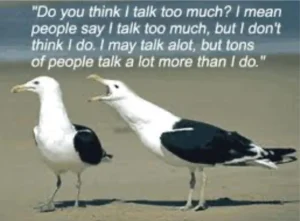We all want to be someone worth talking with—someone others feel safe being with. Whether we’re friends, partners or simply showing up in the roles we play each day, we want people to feel seen, heard and gotten. It’s what we all want, right?
So, today’s post speaks to a dilemma that Andrew, a coach, is challenged by. I believe it speaks to so many of us wanting to be someone worth talking with—being with.
Here’s Andrew’s dilemma:
“My client Craig talks a lot. He hardly takes a breath. I don’t know how to interrupt him without feeling guilty, like, maybe I don’t care or that I’m rude. I’m afraid that he’ll be offended. At the same time, I can’t even begin to coach him because I can’t get a word in. How do you handle clients who talk a lot?”
Andrew, this is such a relatable question. You’re definitely not alone in this. Many people working in the personal development field find themselves in situations where clients dominate the conversation. Let’s unpack this together.

When Talking Becomes a Strategy
First, it’s important to recognize that some clients come into coaching thinking that their job is to talk—just like in therapy. They might assume that your role is simply to listen and let them share whatever’s coming up.
For others, they developed talking as a strategy over time—maybe during childhood. Talking can be a way to avoid silence, discomfort, or vulnerable truths. It might be how they process information or how they learned to be seen and heard.
One client I know of, said to his coach: “As long as I’m talking, you can’t coach me!” Intriguing, right?
Sometimes, when developing a coaching relationship with clients we have to, in a sense, train them in what a coaching session really is about. More about this another time.
For others, talking is a way of processing information. They need to hear themselves think out loud.
So yes, Craig talks a lot. That’s not unusual. But what makes this a coaching dilemma isn’t Craig’s behavior—it’s what it triggers in you.
The Real Issue: Your Fear, Not Your Client’s
Let’s take a closer look at your concerns:
- “I feel guilty interrupting.”
- “He might think I don’t care.”
- “He might feel offended.”
These aren’t Craig’s issues. They’re yours. And that’s actually great news, because it means they’re within your power to shift.
As coaches, we often let our own fears get in the way of being effective. Fear of not being liked. Fear of rejection. Fear of doing it wrong. Fear of losing a paying client. These fears can subtly (or not so subtly) hijack a session, leading us to prioritize comfort over growth.
If you’re afraid to interrupt, ask yourself:
- Am I afraid he’ll leave?
- Am I afraid I’ll appear rude or uncaring?
- What am I making it mean if I interrupt?
When we bring awareness to these fears, we can begin to reclaim our authority and purpose as coaches. And, we are walking our talk, in that we are doing some self-introspection that we expect of our clients. If we aren’t doing the work, most likely they won’t either. (Nobody likes hearing this. And most coaches don’t get coaching themselves—just sayin’!)
A Story from My Own Practice
Years ago, I worked with a client—let’s call her Carla—who would talk and talk and talk. I struggled, like you do Andrew, to get a word in. I wanted to be respectful and supportive, but I was also frustrated and stuck. And frankly, I was afraid I would upset her. I was afraid that she would become defensive and angry. At that time in my life, I was conflict avoidance! Not great for my coaching practice!
I brought this to my coach, who gently reminded me: “If you’re letting your client go on and on and you’re not intervening, you’re not being effective, and you are not being professional. That’s your stuff, not theirs.” YIKES!!
That hit me hard. I realized I was letting my fears get in the way of doing what I was trained to do and what I was getting paid to do. I was worried Carla would leave if I interrupted her. But then I asked myself a powerful question:
What am I being paid to do?
Was I being paid to let a client vent endlessly? Or was I being paid to help her move forward in her life?
When I got clear that my value as a coach comes from my effectiveness—not my niceness—I began to see things differently. I realized that interrupting could be an act of service. And that my clients are paying me to empower them to get out of their own way. I’m a professional and I need to act like a professional! Yep!! Scary!!!
So I tried it. I said, “Carla, I want to pause here. I’m noticing something, and I think it’s important.”
She didn’t like it. She ultimately left my practice. And that was okay. Because I learned a vital truth: Coaching isn’t about pleasing everyone. It’s about being in service to transformation.
Carla wanted a place to vent. That wasn’t the kind of coaching I offer. And the clarity I gained from that experience helped me better serve the clients who are ready to do the deeper work.
The Power of Intention
Here’s the distinction that helped me most:
- Am I interrupting because I’m impatient or annoyed?
- Or am I interrupting because I care and want to bring value?
When your intention is rooted in care and clarity, interrupting becomes an act of alignment, not aggression.
You might say something like:
- “Can I pause you for a moment? I’m noticing something that feels important.”
- “I want to check in here—what you’re saying is powerful, and I’d love to slow it down so we can explore it more deeply.”
- “Let’s pause for a second. I’m wondering if we can zoom out and look at what’s happening in this conversation.”
These interruptions aren’t rude. They’re respectful. They show your client that you’re actively engaged and that you care enough to guide the process, not just passively receive it.
A Different Client, A Different Intention
Now, contrast that with another client of mine—let’s call him Casey. Casey also talks a lot. But our agreement is different. He’s not avoiding the work. He’s processing out loud. He’s reflecting and he’s integrating. And I know—from our relationship—that what he needs most is to be heard and witnessed.
I’m not letting him talk endlessly because I’m afraid. I’m doing it consciously, in service to his process.
That’s the key difference: Am I allowing this because it’s useful? Or because I’m avoiding something?
Final Thoughts
Andrew, you’re not alone in this. Most people supporting personal growth encounter clients who talk a lot. But the real question is: how are you showing up in response?
When you get clear about your intention—to be effective, to bring value, to serve growth—your actions will begin to align. You’ll interrupt not from guilt or fear, but from love and purpose.
And that’s what makes the difference.
So, here’s your practice:
- Reflect on the fears that show up when you consider interrupting.
- Get clear about your intention: What are you here to offer?
- Practice a few gentle but firm interruption phrases.
- Experiment. You might lose a client or two, but you’ll gain clarity, confidence, and alignment, and inevitably you’ll be working with clients who appreciate your professionalism, their time, and their desire for an effective thinking partner.
Keep bringing your truth, your heart, and your courage to the work. You’re making a difference.
I’m sending you blessings and the courage to have all the fun you’re willing to have!
Blessings,
Rosie
For more information about coaching, coach training and supervision with me, check out my website, www.theparadigmshifts.com. And I have a wonderful Coaching Group for Coaches that meet every other Friday, 8am. We talk about the challenges and expansion points of coaching. You can email me at rosie@theparadigmshifts.com
The link to the YouTube Series, I Want to Be A Better Coach is: https://youtube.com/playlist?list=PLRXmvbHljtBgGytj8VMHOjzncoP9tEBoH&si=R19Z25nC-uzt7zgO
If you have questions and challenges that you’d like me to speak to, feel free to click this link and ask your question here: https://docs.google.com/forms/d/e/1FAIpQLScWDeY-B4i7B7f6kH9ealcyth1_CIPohaEc5QPxfQ5k-pcOfg/viewform?vc=0&c=0&w=1&flr=0
Or feel free to leave your question in the comment section.
